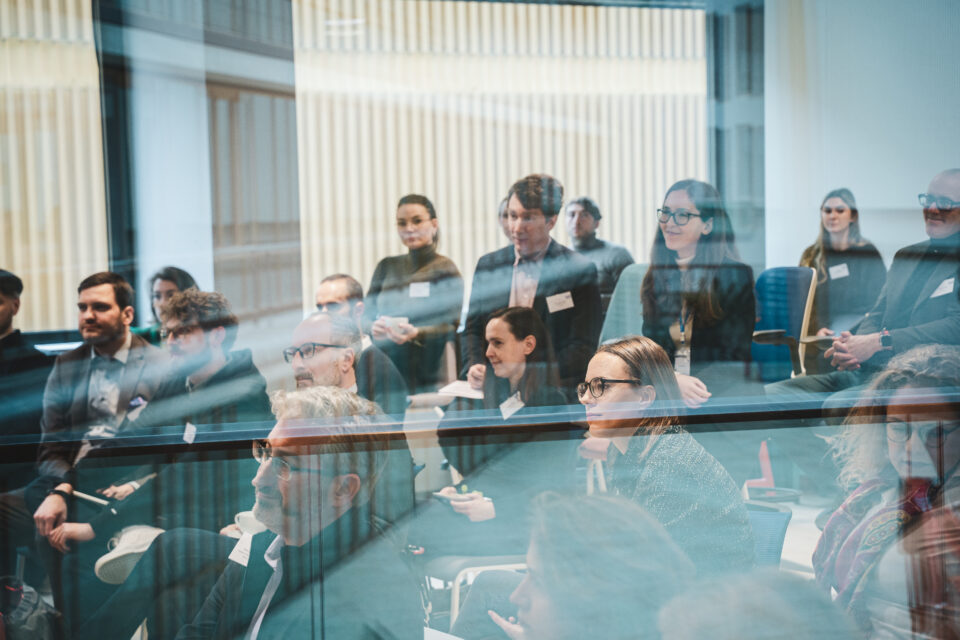TUM Think Tank
Where today's societal challenges meet tomorrow's technological excellence.
Project Description
At the Summit of the Future in New York in September 2024, the international community successfully adopted the Global Digital Compact (GDC) as a first global framework for an open, free, secure and inclusive digital future for all. Similarly, the Secretary General's High-Level Advisory Body on AI (HLAB AI) recently released its recommendations for advancing global AI Governance, highlighting the need for strengthening scientific collaboration and increasing international efforts towards AI and data capacity building.
Moving from negotiations to implementation, now is a pivotal moment in time to advance science-driven, multi-stakeholder action to enable human-centric and inclusive public-purpose technology, and its democratic and human rights-based global governance. To this end, we invite global partners to collaborate as ‘solutions architects’ in a research-to-action community on various high-priority topics of the GDC. The initiative will start with an initial focus on advancing open public interest AI for sustainable and inclusive societies.
Project Goals
1. Advancing Interoperable Global AI Governance:
- Evaluating recent national and regional AI strategies in light of the GDC.
- Developing a repository of best practices for the context-sensitive operationalization and implementation of global AI principles, and exploring avenues for scaling and replicating successful AI governance approaches, legislative frameworks and technology design to new contexts.
- Understanding mechanisms of multi-layered AI Governance at the crossroads of international, regional, national, and local governance, with a special focus on the unique role of large urban conglomerations/mega cities.
2. Enabling Technology Solutions for Accelerating the Sustainable Development Goals
- Co-designing and advancing open-source, public-purpose AI to address local and regional societal challenges through crowd-sourced solutions and active community engagement.
- Co-designing sandboxes as an experimental testing ground for innovative governance and technology solutions, and advancing risks and impact assessments across jurisdictions and levels of governments.
3. Empowering Communities
- Developing AI, data and digital literacy methodologies, learning curricula and open-access training platforms, in collaboration with global and regional educational organizations.
The project goal is to help implement governance and ethics principles by integrating the whole AI life cycle, anchored in concrete use cases. The initiative supports context-sensitive approaches and solutions, reflecting cultural and language diversity, through a holistic ecosystem approach.
The project kickstarts at the Annual Meeting of the Global Network of Internet and Society Research Centers (NoC) in Bangkok – on 17. and 18. October 2024. It will proceed with ideation workshops and learning calls with distinguished experts to identify and co-design first high-impact use cases and develop the project methodology.
About Nicole Manger

Nicole brings a wealth of policy and research expertise at the intersection of Foreign Policy, Law, Technology, and Sustainable Development. She joined the Federal Foreign Office (FFO) of Germany in 2020 in its data and AI driven crisis early warning unit PREVIEW. While at PREVIEW, Nicole led efforts towards advancing global partnerships and programs for putting data-driven, evidence-based decision-making to work for sustaining peace, climate action, and the SDGs. Today, she spearheads efforts in FFO's Coordination Unit for AI in Foreign Policy for Global AI Governance and Digital Cooperation, such as the German engagement for a Global Digital Compact.
In her work at FFO, Nicole launched and led global digital transformation campaigns with the UN, such as the now 30+ Mio. UN Complex Risk Analytics Fund CRAF’d enabling high quality, open-source data and analytics for targeted crisis prevention. She also enabled political agenda setting with the Ministerial Conference “Sustaining Peace Amidst the Climate Crisis: The Role of Data, Science, and Technology”, and advances efforts for a global GovTechecosystem . In her role as Co-Chair of the Task Force on AI and Human Rights in the Freedom Online Coalition, Nicole also focuses on the human rights implications of emerging technologies.
Before joining the Federal Foreign Office, Nicole worked in various functions in diplomacy, security and foreign policy and sustainable development with the US State Department at the US Consulate General in Munich and the Munich Security Conference, as well as with the German Agency for Development Cooperation. She also conducted research at the University of California at Berkeley, the University of Texas at Austin and Göttingen University.
Trained in international relations and law, Nicole’s regional experience spans across North America, Europe, Africa and Southeast Asia. Her previous academic research at the intersection of constitutional law and politics focused on the civil and human rights implications of governmental counter-terrorism efforts and its judicial review mechanisms, global migration and the role of mega-cities, as well as law and politics in multi-cultural jurisdictions.
The Fellowship of Practice is carried out in a personal capacity.
Fellowship of Practice in Collaboration with our Labs
At the TUM Think Tank, Nicole Manger will collaborate with the Global Network of Internet and Society Research Centers (NoC) led by Armando Guio Español, the GovTech Initiative led by Markus Siewert and Urs Gasser, the Ethical Data Initiative led by Sabina Leonelli, as well as the Urban Digitainability Lab led by Stefan Wurster and Markus Siewert.
TL;DR
Leading efforts to enable the research-to-action community, Nicole Manger collaborates with the Global Network of Internet and Society Research Centers (NoC), the GovTech Initiative, the Ethical Data initiative and the Urban Digitainability Lab to work on various high-priority topics of the Global Digital Compact, starting with an initial focus on advancing (open) public interest AI for sustainable and inclusive societies at local, national and regional levels.










